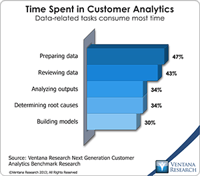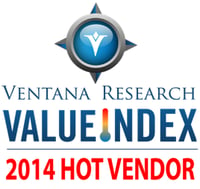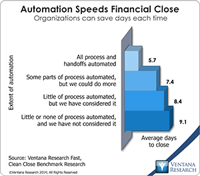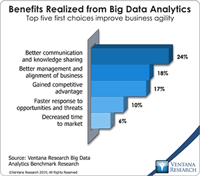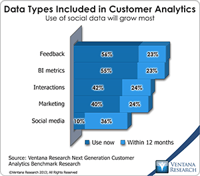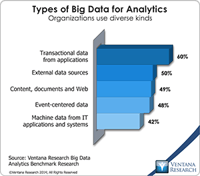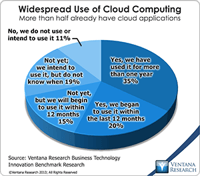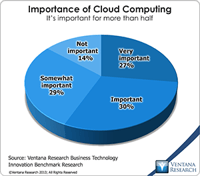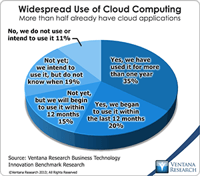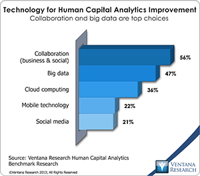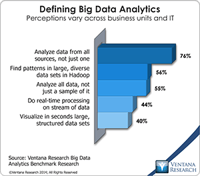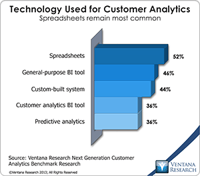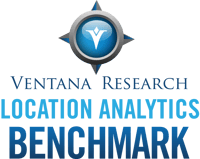Our recently released research into next-generation customer analytics shows that the most participants (52%) use spreadsheets as a customer analytics tool. I recently wrote that while these popular tools are adequate for some tasks, they are not suitable for analyzing large volumes and many types of customer data. So I think it is appropriate that one in four (26%) participants have adopted a dedicated customer analytics tool and a further 29 percent are planning to invest in such a tool in...
Read More
Topics:
Social Media,
Customer Analytics,
Speech Analytics,
Voice of the Customer,
IT Performance,
Operational Performance,
Analytics,
Business Analytics,
Business Collaboration,
Business Intelligence,
Business Performance,
Cloud Computing,
Customer & Contact Center,
Financial Performance,
Information Applications,
Information Management,
Location Intelligence,
Operational Intelligence,
Call Center,
Contact Center,
Contact Center Analytics,
Desktop Analytics,
Text Analytics
At its recent 2014 analyst day Ceridian showed the progress it has made on its Ceridian and Dayforce human capital management (HCM) platform since last year’s launch of its broader HCM portfolio. Ceridian’s overall HCM business, which the company says had revenue of $950 million in 2013 and now has more than 100,000 customers, consists largely of payroll-related products and services such as tax filing and payroll cards, but also benefits, human resources and workforce management products.
Read More
Topics:
Mobile,
SaaS,
Social Media,
HCM,
Operational Performance,
Analytics,
Business Analytics,
Business Collaboration,
Business Intelligence,
Business Performance,
Cloud Computing,
Collaboration,
Workforce Performance,
Ceridian,
Document Management,
HR,
Talent Management
Reconciling accounts at the end of a period is one of those mundane finance department tasks that are ripe for automation. Reconciliation is the process of comparing account data (at the balance or item level) that exists either in two accounting systems or in an accounting system and somewhere else (such as in a spreadsheet or on paper). The purpose of the reconciling process is to identify things that don’t match (as they must in double-entry bookkeeping systems) and then assess the nature...
Read More
Topics:
Office of Finance,
automation,
close,
closing,
Consolidation,
Controller,
effectiveness,
Reconciliation,
XBRL,
Business Performance,
Financial Performance,
Governance, Risk & Compliance (GRC),
CFO,
Data,
Document Management,
Financial Performance Management,
FPM
Read More
Topics:
Big Data,
Pentaho,
Predictive Analytics,
Sales Performance,
Supply Chain Performance,
IT Performance,
Operational Performance,
Analytics,
Business Analytics,
Business Intelligence,
Business Performance,
Cloud Computing,
Customer & Contact Center,
Financial Performance,
Information Applications,
Information Management,
Location Intelligence,
Operational Intelligence,
Workforce Performance,
Datawatch
The last time I reviewed Confirmit it had just acquired CustomerSat and was re-engineering its products to support a broader approach to voice of the customer (VOC), which Ventana Research defines as a complete view of customer interactions, customer sentiments after interactions and the outcomes of those interactions. During my latest briefing, I found out that the new architecture will be available in version 18 of the product, which Confirmit recently announced as generally available....
Read More
Topics:
Social Media,
Customer Analytics,
Customer Experience,
Customer Feedback Management,
Speech Analytics,
Voice of the Customer,
Analytics,
Cloud Computing,
Collaboration,
Customer & Contact Center,
Customer Service,
Call Center,
Contact Center,
Contact Center Analytics,
CRM,
Text Analytics,
Unified Communications
I had the pleasure of attending Cloudera’s recent analyst summit. Presenters reviewed the work the company has done since its founding six years ago and outlined its plans to use Hadoop to further empower big data technology to support what I call information optimization. Cloudera’s executive team has the co-founders of Hadoop who worked at Facebook, Oracle and Yahoo when they developed and used Hadoop. Last year they brought in CEO Tom Reilly, who led successful organizations at ArcSight, HP...
Read More
Topics:
Big Data,
Teradata,
Zoomdata,
IT Performance,
Business Intelligence,
Cloudera,
Hortonworks,
IBM,
Information Applications,
Information Management,
Location Intelligence,
Operational Intelligence,
Oracle,
Hive,
Impala,
Strata+Hadoop
Information technologists are fond of predictions in which the next big thing quickly and entirely renders the existing thing so completely obsolete that only troglodytes would cling to such outmoded technology. While this vision of IT progress may satisfy the egos of technologists, it rarely reflects reality. Mainframes didn’t disappear, for example. Although they long ago lost their dominant position, many remain key parts of corporate computing infrastructures. The IT landscape is a hybrid...
Read More
Topics:
Microsoft,
SaaS,
Sales,
Salesforce.com,
ERP,
HCM,
Human Capital,
Office of Finance,
Dynamics AX,
Dynamics GP,
Dynamics NAV Dynamics SL,
PSA,
Sage Software,
Unit4,
Analytics,
Business Performance,
Cloud Computing,
Financial Performance,
CFO,
FinancialForce,
HR,
Infor,
Workday,
Plex,
Professional Services Automation
Building a contact center is growing in complexity as companies struggle to support customers’ ever-higher expectations. Customers now insist on engaging with companies through the channel of their choice, often from a mobile device, and at a time of their choosing. If they interact with a person, they expect that person to have the social and technical skills to resolve their issues quickly and effectively. If they use any form of self-service, they expect the technology to help rather get in...
Read More
Topics:
Social Media,
Customer Analytics,
Customer Experience,
Customer Feedback Management,
Social CRM,
Speech Analytics,
Voice of the Customer,
Mobile Apps,
Self-service,
Operational Performance,
Analytics,
Cloud Computing,
Collaboration,
Customer & Contact Center,
Customer Service,
Call Center,
Contact Center,
Contact Center Analytics,
CRM,
Desktop Analytics,
Text Analytics,
Unified Communications,
Workforce Force Optimization
At Oracle’s recent cloud computing analyst summit in sunny Palm Springs, the company’s executive team insisted that it sees clear skies for its efforts in cloud computing. The summit was led by senior executive Thomas Kurian, who runs the entire product organization and reports directly to CEO Larry Ellison. He affirmed that Oracle intends to offer the full range of cloud computing – public, private and hybrid models – to its customers and partners. As one of the world’s largest software...
Read More
Topics:
Big Data,
Database,
Microsoft,
SaaS,
Sales Performance,
Social Media,
Software as a Service,
Supply Chain Performance,
Middleware,
Oracle Cloud,
Operational Performance,
Business Analytics,
Business Collaboration,
Business Intelligence,
Business Performance,
Cloud Computing,
Customer & Contact Center,
Financial Performance,
IBM,
Information Applications,
Information Management,
Oracle,
Workforce Performance,
Database as a Service,
Verizon
Convergence is the Microsoft Dynamics business software user group’s meeting. Dynamics’ core applications are mainly in the accounting and ERP category, descendants of products Microsoft acquired: Great Plains (now GP), Solomon (SL), Navision (NAV) and Damgaard’s Axapta (AX), to which Microsoft has added its own CRM application. It has been more than a decade since the acquisitions of Great Plains (which itself had already purchased Solomon Software), and Navision, Damgaard and the software...
Read More
Topics:
Microsoft,
SaaS,
Sales,
Sales Performance,
Salesforce.com,
ERP,
HCM,
Human Capital,
Office of Finance,
Consulting,
distribution,
Dynamics AX,
Dynamics GP,
Dynamics NAV Dynamics SL,
PSA,
Sage Software,
Unit4,
Operational Performance,
Analytics,
Business Performance,
Cloud Computing,
Customer & Contact Center,
Financial Performance,
CFO,
FinancialForce,
HR,
Infor,
Workday,
Plex,
Professional Services Automation
At its recent Connect 2014 event IBM announced IBM Kenexa Talent Suite, an integrated talent management suite. The release strengthens its Smarter Workforce initiative by combining IBM and Kenexa products and services in one human capital management (HCM) offering. IBM Kenexa Talent Suite also addresses increasing efforts by human resources organizations to optimize their activities through more effective use of technology, a topic covered in our 2014 HCM research agenda. Specifically, the...
Read More
Topics:
Big Data,
Mobile,
SAP,
Social Media,
HCM,
Kenexa,
Recruiting,
Analytics,
Business Analytics,
Business Collaboration,
Business Intelligence,
Cloud Computing,
Collaboration,
IBM,
Oracle,
Workforce Performance,
Cognitive Computing,
HR,
IBM Watson,
Social
Many businesses are close to being overwhelmed by the unceasing growth of data they must process and analyze to find insights that can improve their operations and results. To manage this big data they find a rapidly expanding portfolio of technology products. A significant vendor in this market is SAS Institute. I recently attended the company’s annual analyst summit, Inside Intelligence 2014 (Twitter Hashtag #SASSB). SAS reported more than $3 billion in software revenue for 2013 and is known...
Read More
Topics:
Big Data,
Predictive Analytics,
SAS,
Event Stream,
Operational Performance,
Analytics,
Business Analytics,
Business Intelligence,
Business Performance,
CIO,
Customer & Contact Center,
Data Management,
Information Applications,
Information Management,
Location Intelligence,
Operational Intelligence,
Discovery
I recently completed two closely related benchmark research reports, on next-generation customer engagement and next-generation customer analytics. The research on customer engagement shows that companies on average engage with customers through seven or eight communication channels and that almost every business unit except IT engages with customers. To provide customers with personalized, in-context and consistent experiences across these channels, companies need an up-to-date, complete view...
Read More
Topics:
Customer Analytics,
Customer Experience,
Speech Analytics,
Voice of the Customer,
Operational Performance,
Analytics,
Business Analytics,
Business Intelligence,
Business Performance,
Customer & Contact Center,
Governance, Risk & Compliance (GRC),
Information Management,
Call Center,
Contact Center,
Contact Center Analytics,
Desktop Analytics,
Text Analytics
Adding geographic and location context to business information enables organizations to develop fuller understanding and optimize the activities of people that use the information. We call this location intelligence, and to achieve it requires location analytics, which focus on that context where the processing and presentation of geography and spatial aspects of data are utilized. Analysis of geographic information can provide business insights that help organizations make better business...
Read More
Topics:
Sales Performance,
Supply Chain Performance,
Customer Analytics,
GIS,
Location Analytics,
IT Performance,
Operational Performance,
Analytics,
Business Analytics,
Business Intelligence,
Business Performance,
Cloud Computing,
Customer & Contact Center,
Financial Performance,
Information Applications,
Information Management,
Location Intelligence,
Operational Intelligence,
Workforce Performance
